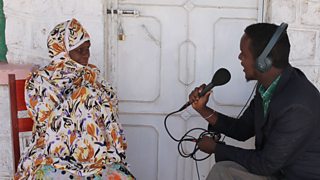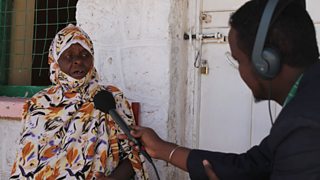Asha’s story: stopping polio in its tracks
Barkhad Kaariye
Producer, Â鶹ԼÅÄ Media Action in Somalia
I knew this was going to be a story worth the 300km trip from my home town of Hargeisa to Burao in Somaliland. It was early morning and the sun was just about to set out from the east when I visited the brightly painted but crumbling Burao General Hospital in Somaliland. There in the courtyard I found Asha Farah Hersi, a remarkable 70-year-old woman who works to vaccinate people against incurable diseases like polio.
A tall woman stooped by age, Asha couldn't wait to start work even at this early hour. When I met her, she had a small, portable fridge containing vaccines in her left hand and her pen in her right.
At first, she couldn’t understand why I would want to record an interview with her. She told me she had "nothing to say" and that she was only "serving my people." But when I explained that I wanted to interview her for , she agreed.

Asha has worked as a vaccinator and health campaigner for almost 43 years – she was only 27 when she became one of very few female health workers in Somaliland.
It's a tough job – and not just because it involves travelling to remote villages as well as working in Burao hospital. As Asha told me, all too often communities believe the myths rather than the facts of vaccination. They often think that the vaccines contain the disease itself or that it affects human fertility.Â
Asha remembers the hardest challenge she's ever faced. "One day we paid a visit to a house where we were to give the oral polio vaccine to the children. The husband was sleeping when we got there, but when he noticed we were there to give a vaccine to his children, he got up and chased us with a stick all the way back to the hospital. We had to run almost one kilometre and left the vaccine fridge and everything we had behind."
"A policeman collected our belongings from the scene later and they briefly arrested him," Asha added with a wry smile.
So why does she continue to do such a tough job at the age of 70? Her answer comes quickly and firmly: "First of all, I’m serving my country and my people," she says. "Secondly, I’m working for myself." She helps to provide for her family and her pride is very clear to see.
And how does she convince people to think again about getting their children vaccinated? "We tell people that vaccination is going on in every country in the world and no one can travel to other countries unless they are vaccinated," she says.
"We tell them that even travel to Hajj in Saudi Arabia without a polio vaccination is not allowed. And we keep on telling them that the polio vaccination can do nothing to human fertility but that it prevents people from [catching] polio – and the paralysis it can cause."

She also told me it was important that people knew she had been vaccinated too. "I’m not only telling the people to get vaccinated. I have done it as well. I took the oral drops of polio vaccination because I want to live a healthy life."
As part of our 15-minute radio show, Dhibcaha Nolosha (Drops for Life), we interview vaccinators like Asha alongside other features, such as interviews with parents and children who have been vaccinated and different experts.
Our aim is to improve understanding about polio and challenge the negative attitudes towards vaccination that last year led to the first recorded outbreak of polio in Somalia for six years. While in Somaliland health workers like Asha have not found themselves under threat, in the South Central and Puntland regions of Somalia they have been threatened and attacked for their work.
Asha had a busy day ahead of her and couldn't wait to get on so she left me with the advice she gives to parents. "He who gives vaccination to his child deserves to be thanked," she said, "But he who rejects it has no logic and knows no reason. I advise the parents, be a good parent and let your children be vaccinated to protect them from incurable diseases like polio which means they could be paralyzed for life."
And with that, Asha picked up her vaccines and was gone.
Dhibcaha Nolosha (Drops for Life) is made with funding from UNICEF (The United Nations Children’s Fund).
Related links
Follow Â鶹ԼÅÄ Media Action on and
